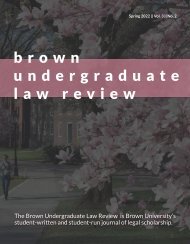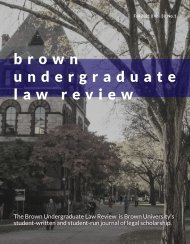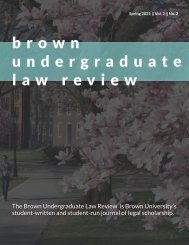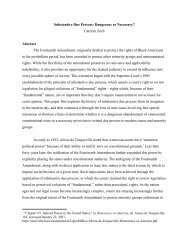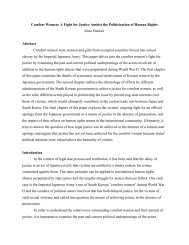Brown Undergraduate Law Review -- Vol. 2, No. 1 (Fall 2020)
We are proud to present the Brown Undergraduate Law Review's Fall 2020 issue. We hope you will all find our authors' works fascinating and thought-provoking.
We are proud to present the Brown Undergraduate Law Review's Fall 2020 issue. We hope you will all find our authors' works fascinating and thought-provoking.
You also want an ePaper? Increase the reach of your titles
YUMPU automatically turns print PDFs into web optimized ePapers that Google loves.
The Kosovo War: Wartime Sexual Violence Jurisprudence and State Action Toward Recovery
Introduction
the implications of President Jahjaga?s innovative
Between February 1998 and June 1999, the Kosovo War
wreaked havoc on the Balkans as Serbia, led by President
Slobodan Milo?evi?, perpetrated blatant human rights
violations against Albanian Kosovars. This conflict can be
approach for the global human rights regime. Her
reparative, restitutive, and supportive agenda promoted
healing for survivors of wartime sexual violence, a
response that serves as a viable recovery model for other
characterized not only by its campaign of ethnic cleansing
conflict-afflicted states worldwide. On the 20th
through mass detentions, abductions, torture, and killings
but also by Serbia?s strategic implementation of sexual
violence against Albanian Kosovars as a weapon of war.
Sexual violence in wartime is an age-old phenomenon, as
oppressors throughout history have found it a highly
effective tool of suppression when targeting particular
groups. For Kosovo?s more than 20,000 survivors of
weaponized rape, sexual violence has left a haunting,
long-lasting impact? even beyond the tragic loss of
homes, livelihoods, and loved ones that these victims
continue to grapple with today in the wake of Milo?evi??s
ethnic cleansing campaign. Matters of justice for survivors
of human rights violations are an ongoing question,
informed by international politics as well the as collective
and individual memories and needs of survivors. During
her tenure from 2011 to 2016, former President of Kosovo
Atifete Jahjaga took a novel approach by prioritizing
justice for survivors who endured sexual violence during
anniversary of the Kosovo War, Kosovo is a case study of
how rape was systematically used as a weapon of war that
violated both victims?human rights and universal laws of
war. The eventual intervention by the international legal
community illustrates the limitations of international
justice systems, which often introduce valuable legal
frameworks while simultaneously proving ineffective at
ending the impunity of human rights abusers. Such hollow
mechanisms bring Kosovo?s own response to the
brutality?s aftermath into sharp relief by contrast, as the
response provides a workable model for rehabilitating
victims and pursuing justice. The Kosovo case illustrates
the extent to which progress has been made in international
women?s rights and how a country should and should not
pursue accountability for perpetrators of mass, gendered
sexual violence.
Historical Context: The Kosovo War and Sexual
Violence
the war. More than 20 years after the conflict, Kosovo
In 1945, the autonomous provinces of Kosovo and
demands the justice and accountability that Serbia
Vojvodina were established within the post-World War II
continues to withhold. In the interim, however, Kosovo
Serbian Republic, one of six constituent republics within
serves as a model for how a recovering state should
the Socialist Federal Republic of Yugoslavia (comprised of
respond to victims?needs as it calls for legal justice while
Bosnia, Herzegovina, Croatia, Macedonia, Montenegro,
providing support in the aftermath of wartime atrocities.
Slovenia, and Serbia). Under Josip Broz Tito, the Serbian
This analysis will provide historical background for the
conflict and discussion about the legal context of the
human rights violations and the ways in which offenders in
the Kosovo War have (and have not) been held
accountable. It then delves into formulations and
applications of justice for victims and goes on to discuss
authorities repressed the Kosovars. When Tito died in
1980, protestors called for the province to become a
republic, spurring more oppression from Serbia. Slobodan
Milo?evi? was elected President of Serbia in 1989 through
calls to win back Kosovo (a majority ethnically Albanian
country) for Serbia. This platform reopened nationalist
Brown Undergraduate Law Review
8




